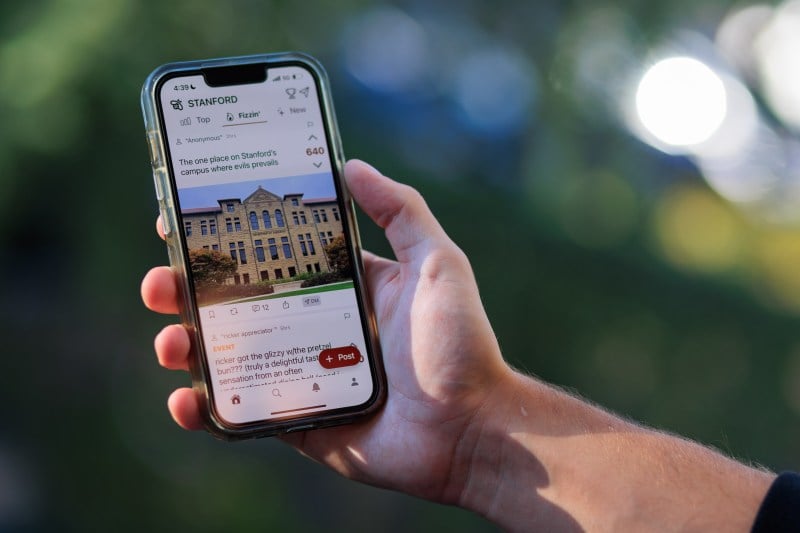A 2 a.m. text after a fraternity party was just the beginning — one year and a myriad of developments later, anonymous social app Fizz has closed a $4.5 million seed round, rounding out a lucrative year for the Stanford-originated startup launched in 2021.
What’s next? A nationwide expansion, according to the company’s chief executive officer: “By the end of the 2023 academic year, we hope to be on more than a thousand U.S. campuses,” Rakesh Mathur told The Daily.
Mathur, who received the text from his daughter after the party, led the fundraising round that landed the app funding from Lightspeed Venture Partners, Octane Venture Partners and other Silicon Valley angel investors.
Co-founded in November 2020 by Chief Operating Officer Teddy Solomon and Chief Technology Officer Ashton Cofer, many students on Stanford’s campus use Fizz as a go-to for real-time updates on campus life. Solomon and Cofer, originally members of the class of 2024, left Stanford in December 2021 to pursue Fizz full-time.
The app is used by 95% of Stanford undergraduates since its official launch in July 2021, its founders told TechCrunch — though the app is not available on Android, and TechCrunch wrote, “Some of this adoption might be a bit inflated.”
Rakesh Mathur first heard of Fizz when Solomon met Ila Mathur ’25 at a Sigma Nu fraternity party in October 2021, a few months into Fizz’s growth at Stanford. Similar to many parties Solomon attends, they talked about Fizz. Yet “what doesn’t usually happen is, at 2 a.m., getting a text saying, ‘My dad is an entrepreneur, you need to meet him. I think you guys would have so much to talk about,’” Solomon said.
And from there, Solomon and Cofer met Rakesh Mathur, who has co-founded 10 start-ups, six of which were sold to large tech companies. According to Solomon, while he and Cofer had a strong grasp on the product and market, Mathur brought his expertise in scaling the business, fundraising and building a team.
Upon meeting the co-founders, Mathur jumped on board as CEO. “When they showed me the app and expressed their inspiration behind creating it, I was all in,” Mathur said.
The app was born out of the challenges of the pandemic; while attending Stanford remotely in the 2020-21 academic year, the founders said many students found difficulties in making campus connections and creating engaging social life.
These issues were exacerbated by what Solomon dubbed a “socially anxious generation,” where apps such as Instagram promote highlight reels over genuine content. Moreover, the co-founders said they noticed students’ hesitation to interact on other platforms, such as GroupMe, where they were identifiable.
As a father, Mathur said he saw the value in Fizz’s authenticity for college students, having “witnessed that Gen Z is starting to tune these platforms out.”
According to Solomon, Fizz generates real conversation through anonymous student posts in a Reddit-like format. The hyperlocality of the platform means that “a student at Stanford wouldn’t understand the post in the Rice community and vice versa. And that’s really what makes it special,” Solomon said.
“At that point, it wasn’t just an idea,” Mathur added. “The app had grown rapidly through the Stanford community, and I knew it had the potential to continue on that path at other schools nationwide.”
The app has since expanded to a dozen colleges, including Rice, Wake Forest, Tulane, Elon, Chapman and more. Growth at these schools is “on par or better than what we saw at Stanford. We have a clear product-market fit across the schools,” Solomon said.
To scale the app, Solomon said Fizz, which currently has 22 full-time employees, hopes to add senior product engineers and grow the marketing team, along with recruiting additional moderators at different campuses.
Only those with a valid college .edu email address can post to their school, and Solomon said the app’s decentralized content moderation model is a strength.
“Students at the school who understand the posts are the ones moderating, and that’s what allows us to keep the community safe,” Solomon said. “So what we are providing is the first community platform that is safe, that is engaging, that is private.”
New features are also in the works for Fizz, such as the recently rolled-out user verification. Last Friday, mixed messages over cancellation of the annual all-campus Eurotrash party festered on Fizz, until a verified post by host Kappa Sigma put a rest to the confusion.
Fizz users reacted positively to this move; multiple other student organizations, including The Stanford Daily and several Stanford fraternities, have now also been verified.
Solomon claims that the reception at Stanford has been “incredible” from his and Cofer’s standpoint.
“I truly do believe that what we’re what we’re bringing in terms of a more authentic community . . . is what this generation needs,” Solomon said. “I am just ecstatic [about] what’s ahead.”
